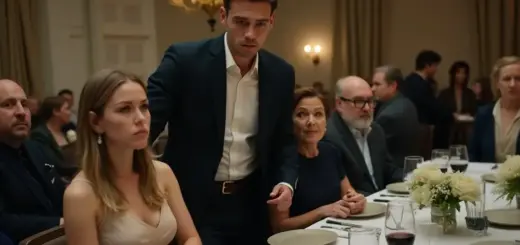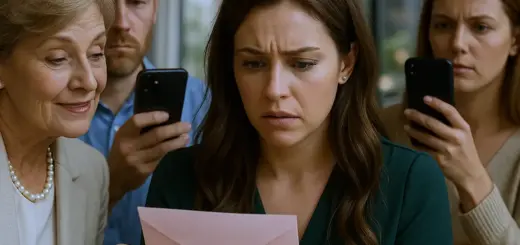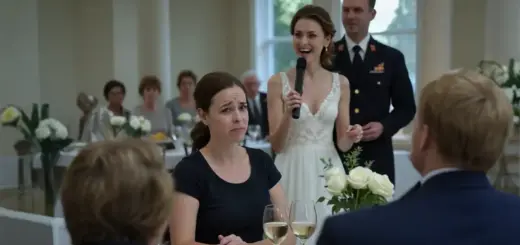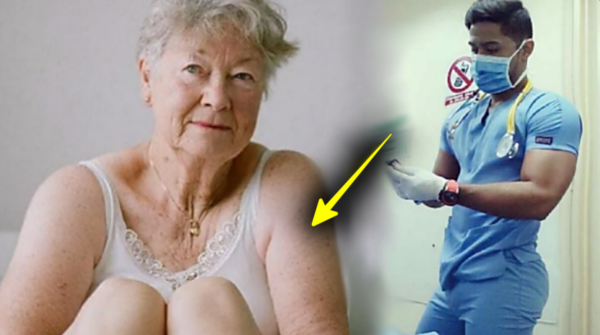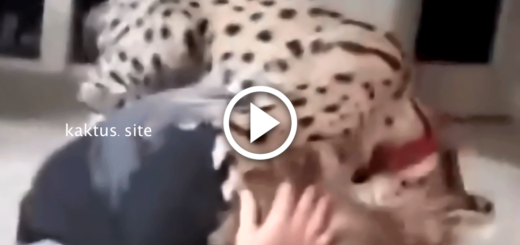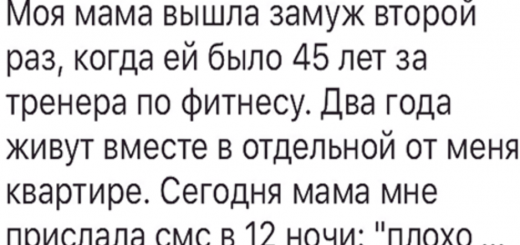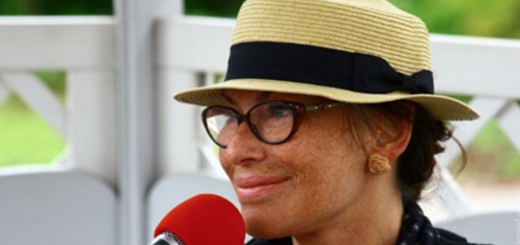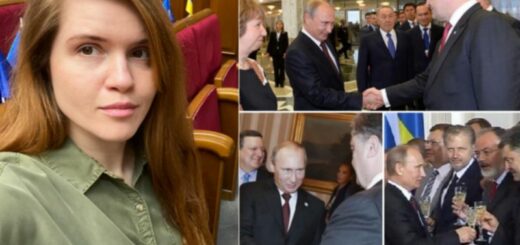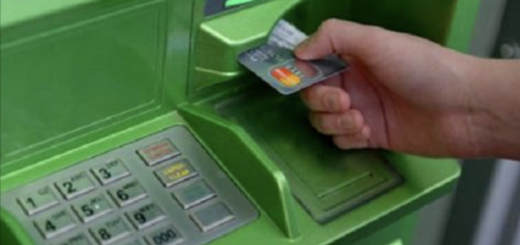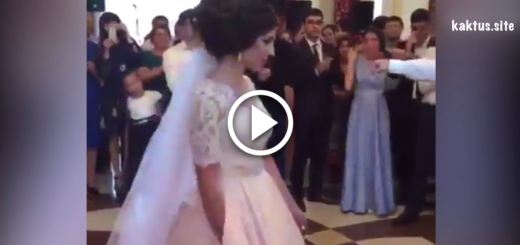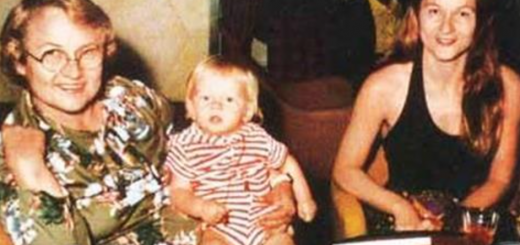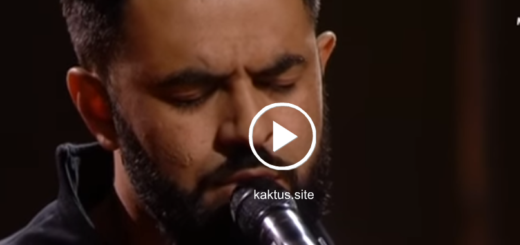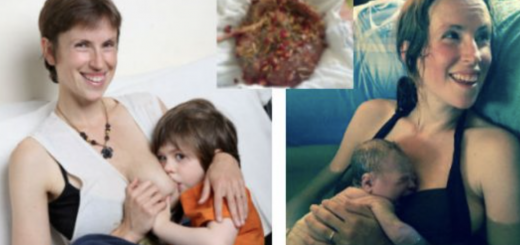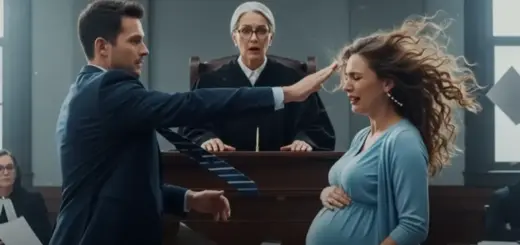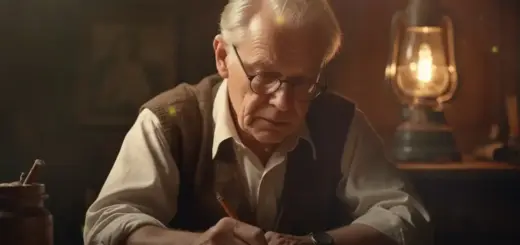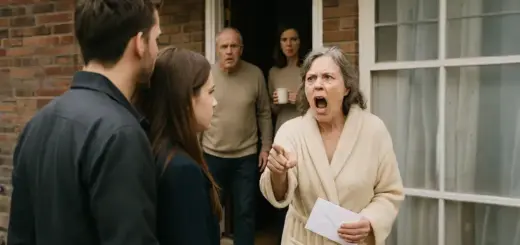Near the silent auction tables, I overheard Bradley’s wife, Jessica, speaking to a small group of women. «We had no idea, of course. Bradley barely knew Caleb outside of work functions.»
I activated the recording app on my phone, keeping it casually at my side.
«Please,» another woman laughed.
«Bradley was at every boy’s night. Remember that Vegas trip last year? My husband said they were practically celebrating something. Now we know what.»
«The Singapore deal,» Jessica admitted, her voice dropping. «Bradley mentioned it once. Said Caleb had found a ‘creative’ solution to the funding problem. We should have known ‘creative’ meant ‘illegal’.»
These admissions, these small acknowledgements of willful blindness, were building blocks in a larger structure of accountability. My lawyer would be very interested in Bradley’s prior knowledge of the Singapore deal. The divorce proceedings had begun two weeks earlier, and Caleb had arrived with a strategy that was breathtaking in its audacity.
His attorney argued that my substantial surgical income should be factored into the settlement, that my earnings should offset his current inability to work due to the criminal proceedings.
«Your Honor,» Caleb’s attorney had stated, «Dr. Morrison earned over $400,000 last year. Mr. Hartley’s career has been destroyed by allegations that—»
«By federal charges,» my attorney, Diana, interrupted.
«Not allegations. Charges. Based on evidence Dr. Morrison provided after discovering her husband’s criminal activity.»
Diana then produced a folder that made Caleb visibly pale.
«We’ve discovered cryptocurrency wallets in Mr. Hartley’s name containing approximately $200,000 in Bitcoin, purchased over the last 18 months. Additionally, there’s an art collection valued at $300,000 stored in a climate-controlled facility in Schaumburg under his mother’s name but paid for with marital assets.»
Each revelation was another cut, precise and calculated.
Caleb’s attorney scrambled to respond, but Diana wasn’t finished. «There’s also the matter of the boat registration in Michigan, the investment property in Wisconsin he never disclosed, and the safety deposit box at First National containing gold coins and bearer bonds.»
By the end of that hearing, Caleb’s position had crumbled entirely. He would leave the marriage with his criminal defense attorney fees and nothing else.
Two days after the divorce hearing, Sarah Coleman contacted me. Tyler’s wife had discovered her own cache of evidence and wanted to compare notes. We met at a quiet coffee shop in Lincoln Park, two women bound by the peculiar sisterhood of betrayal.
«Tyler recorded everything,» Sarah said, sliding a USB drive across the table. «He had this app on his phone that automatically recorded calls, including ones with Caleb.» The recordings were damning.
Conversations about moving money, discussions about other accounts they’d targeted, jokes about their wives being too stupid or too trusting to notice. In one particularly chilling exchange, they laughed about a retired teacher whose entire pension they’d drained.
«Her name was Dorothy Petway,» Sarah said. «Taught third grade for 40 years. They took everything.»
That conversation led to another revelation. Sarah had been contacted by five other women, all connected to the scandal in various ways. Some were wives of co-conspirators. Others were victims whose husbands’ retirement accounts had been plundered.
We organized a meeting at my house the following week. Seven women gathered in my living room on a Thursday evening. We ranged in age from 23 to 68, united by our connection to this web of financial crime and emotional violence.
There was Margaret Chin, whose husband’s entire 401k had vanished. Patricia Williams, whose husband had been Bradley’s partner before the firm collapsed. Linda Martinez, who discovered her husband had been facilitating the money laundering.
«We’re not just victims,» I said, opening the meeting. «We’re witnesses. We have information that can expand this investigation, ensure everyone involved is held accountable.»
Margaret nodded firmly. «I’ve been documenting everything for months. My husband thought I didn’t understand finance because I taught elementary school. He was wrong.»
Over wine and carefully organized evidence, we built our case. Each woman contributed pieces: recorded conversations, suspicious documents, financial records that didn’t add up. Patricia had emails showing the crime went back five years. Linda had photographs of meetings that were supposedly never held.
«They thought we were decorations,» Linda said, her voice steady with controlled anger. «Pretty things to display at parties while they built their empires on theft. They never imagined we were paying attention.»
By the end of that evening, we had enough additional evidence to expand the federal investigation significantly. Our group chat became a command center for accountability. Each woman committed to ensuring that justice reached beyond just the primary conspirators.
As I cleaned up after everyone left, I found a sticky note Sarah had left on my kitchen counter. «They called us trophy wives. Let’s show them what trophies are really made of: solid gold and impossible to break.»
I tucked Sarah’s note into my kitchen drawer, a small reminder of the solidarity we’d built from shared devastation. Nine months had passed since that first gathering, and today we would all sit together again, but this time in a federal courtroom for Caleb’s sentencing. The courthouse stood against a harsh February sky, its limestone columns looking like bars already.
I arrived early, wanting to review my victim impact statement one final time. The paper trembled slightly in my hands, not from fear, but from the weight of speaking for so many who’d been silenced by shame and confusion. The courtroom filled gradually.
Eleanor arrived wearing black, her face composed but aged by months of revelation about the son she’d raised. Behind her, the other women from our group filed in: Margaret, Patricia, Linda, Sarah, and three others who’d joined us as the investigation widened.
Amanda wasn’t there, too close to her due date to travel, but she’d sent her own written statement for the judge to review. When they brought Caleb in, the orange jumpsuit had replaced his tailored suits, and federal custody had worn away his carefully maintained exterior. He’d lost weight, his face gaunt, the confidence that once commanded rooms reduced to something hollow. His eyes searched the gallery until they found mine, holding my gaze for a moment before I looked away.
«Mrs. Hartley,» the prosecutor addressed me when my turn came. «You may deliver your statement.»
I stood, my heels clicking against the courtroom floor with the same rhythm they’d had leaving Marcus’s penthouse that night.
The podium felt solid under my hands as I began. «Your Honor, I’m not here to talk about the money Caleb stole, though the damage extends to dozens of families. I’m here to talk about the theft that doesn’t show up in financial records: the systematic destruction of trust disguised as marriage.»
Caleb shifted in his seat, his shackles making a small metallic sound.
«For five years, I was married to a man who treated cruelty as entertainment, who would publicly humiliate me at social gatherings, then gaslight me into believing I was too sensitive when I objected. I found receipts hidden in his home office.»
«Jewelry, designer handbags, spa treatments, gifts purchased but never given, kept as trophies of deception while he told me we needed to budget more carefully.»
Eleanor made a small sound, pressing a tissue to her eyes.
«Those same receipts were filed with documentation for Amanda Harrison’s apartment, as if betrayal was just another business expense to be categorized and filed. He kept spreadsheets, Your Honor. Actual spreadsheets tracking his lies, his affairs, his stolen money, with the same precision he used to track our household expenses while telling me my surgical equipment purchases were excessive.»
I looked directly at Caleb then, watching him shrink into himself. «At a party in front of colleagues and friends, he told me he’d rather kiss his dog than kiss me, that I didn’t meet his standards. That room laughed while my marriage publicly ended, turned into entertainment for people who knew about his affairs, his theft, his complete moral bankruptcy, but said nothing because it was more fun to watch me not know.»
The judge leaned forward slightly, his expression grave.
«The financial crimes destroyed retirements and futures, but the emotional violence he wielded destroyed something deeper: the ability to trust, to feel safe in your own home, to believe that love means something more than performance and possession.»
«He didn’t just steal money. He stole years of my life, my confidence, my faith in partnership. That theft has no restitution amount.»
I returned to my seat as others gave their statements. Dorothy Petway, the retired teacher, speaking about losing her entire pension. Marcus’s father describing the betrayal of trusting his son’s best friend. Amanda’s written statement read aloud about workplace predation and abandoned promises.
When the judge finally spoke, his voice carried the weight of everything he’d heard. «Mr. Hartley, the federal guidelines suggest five years for your financial crimes. However, the aggravating factors here—the breach of fiduciary trust, the exploitation of marital assets, the systematic nature of your deception—warrant a departure from those guidelines.»
«I sentence you to seven years in federal prison.»
The gavel came down with finality. As the guards prepared to lead him away, Caleb turned toward me, mouthing words that looked like, «I’m sorry,» but I was already turning away, reaching for Sarah’s hand, then Margaret’s, creating a chain of women who’d survived similar devastation and found strength in shared truth.
Eleanor approached as we left the courtroom. «Claire, what you said in there… I never understood what he put you through. I failed you as a mother-in-law, and I’m deeply sorry.»
That evening, my apartment filled with the same women who’d gathered months earlier, but the atmosphere had shifted from grief to something resembling hope. Sarah arrived with champagne, purchased with funds from Tyler’s seized assets, a detail that made us all smile grimly. «To justice,» Margaret raised her glass.
«To survival,» Patricia added.
«To never being silent again,» Linda concluded.
We shared updates on our new lives. Sarah was back in school, pursuing the law degree she’d abandoned when Tyler convinced her they didn’t need two careers. Margaret had started a foundation helping elderly victims of financial fraud. Patricia was dating again, slowly, carefully, but with hope.
«I got a letter from Amanda,» I announced, pulling it from my purse. They gathered around as I read aloud.
She was eight months pregnant now, planning to raise the child alone with her parents’ support. She was also writing a book about predatory workplace relationships, asking if I’d write the foreword. «I want to call it ‘Standards’,» her letter explained, «because men like Caleb always talk about standards while having none themselves.»

